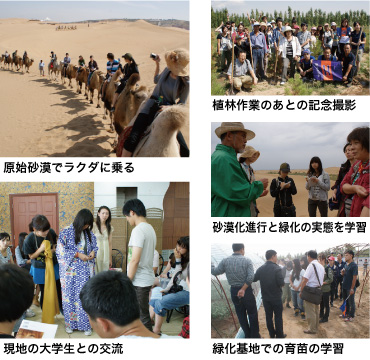Learning through the five senses
Field Study is a program designed for students to go beyond the campus to experience firsthand the social and natural environment in which we live, and to raise their awareness of the issues through a variety of hands-on experiences. Field study opportunities include nature conservation, community development, agriculture, community welfare, culture, international cooperation, tree planting, and more. The various experiences you will gain through the use of all five senses will be a great source of nourishment for you in the future.
Course List (The following courses were conducted in 2010)
| Theme | Location |
|---|---|
|
Iida City, Nagano Prefecture (central city and suburban mountain areas) and Tsumago, etc. |
|
Tokyo, Kanagawa Pref. |
|
Misato City, Saitama Prefecture |
|
A. Mt. Fuji area, Izu Peninsula B. Kusatsu Onsen, Tsumagoi Village cabbage fields, Asama Volcano |
|
Yoshikawa Ward, Joetsu City (formerly Yoshikawa Town), Niigata Prefecture |
|
Ajigasawa Town, Goshogawara City, Aomori Prefecture |
|
Tokyo Metropolitan Government (Waterworks Bureau, Sewerage Bureau, Environment Bureau) |
|
Yukiwarisou mountain villa, Usui-gun, Gunma |
|
Izu Oshima Island |
|
Sannai-Maruyama Site" in Aomori City and "Tosaminato Site" in Goshogawara City |
|
Tokyo and neighboring prefectures |
|
Kubuqi Desert, Ordos Desert, Huhhot, and Beijing, Inner Mongolia, China |
|
Asama Volcano |
|
Ordos Desert, Inner Mongolia, China, etc. |
|
Goshogawara City, Aomori Prefecture, and others |
|
The Netherlands (Amsterdam, The Hague), Germany (Hamburg, Lübeck) |
№1 City planning of Iida, a city of environment and culture, local traditional arts and society
Iida City, a former castle town, is a typical regional city with a population of approximately 100,000. It is also famous as an environmental and cultural city in Minami-Shinshu, a region that loves puppet shows and apple trees and promotes eco-tourism. In this field study, participants will consider the future of the region by participating in a puppet theater festival and learning about the activities of Iida City, which aims to create an environmentally oriented city from various perspectives. In addition, participants will experience traditional food and crafts, and will immerse themselves in the surrounding Tsumago area and other traditional townscapes to learn about the transmission of culture and town revitalization both physically and mentally.
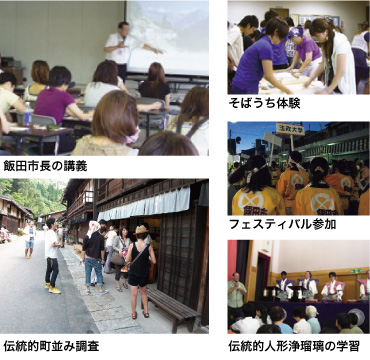
№2 Drivability and quietness of Eco-Cars
These field studies were designed to see, learn about, and touch electric vehicles (EVs) and fuel cell vehicles (FCVs), which are expected to become increasingly popular as we move away from gasoline and reduce air pollution.
The participants visited Nissan Motor (Oppama Plant), the industry leader in EV technology, the hydrogen and fuel cell demonstration project facility, a national project for FCVs, and the Kanagawa Prefectural Government, which is promoting the spread of EVs, to learn about EV and FCV technology, industry trends, and transportation policies. They also test-drove EVs and FCVs and felt the comfort and acceleration of the vehicles. Furthermore, they measured the noise level inside the vehicle while driving using a sound level meter and analyzed the correlation between driving conditions and the quietness of the vehicle interior based on the large amount of data they collected.
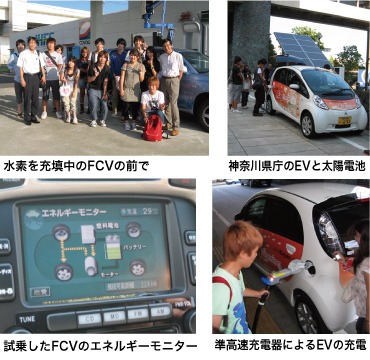
№3 Consideration of agriculture and farming village from beech forest
In Yoshikawa Ward, Joetsu City, Niigata Prefecture, we will consider the problems of agriculture and farming villages in Japan today. Yoshikawa is a farming community where rice cultivation (Koshihikari) is carried on using water from the beech forests spreading on Mt. In this course, you will learn about the actual situation of food self-sufficiency, environmentally friendly agriculture, large-scale mechanized agriculture, and agriculture in terraced rice paddies in mountainous areas through direct interviews with government officials, agricultural organizations, and farmers. Come experience the beautiful nature of Yoshikawa and broaden your horizons by learning about the lives of the people who live there. Enjoy learning while eating homemade ice cream.

No.4 Natural energy, nature conservation and community revitalization
In Ajigasawa Town, Aomori Prefecture, we will consider the relationship between natural energy, nature conservation, and local communities. Regarding natural energy, we will visit a wind power plant funded by citizens (citizen windmill) and a woody biomass plant using pruned apple branches. They will also learn about the relationship between natural energy and local community activities by participating in community activities using a community development fund created by NPOs involved in the citizen windmill project, citizens who have invested in the project, and the local government. In addition, they will visit the Shirakami Sanchi, known as a World Heritage site, to learn about the relationship between people's livelihoods and the Shirakami Sanchi. This will give you a glimpse of the original Shirakami Sanchi and the lives of its people, which is a different aspect from the Shirakami Sanchi World Heritage Site.
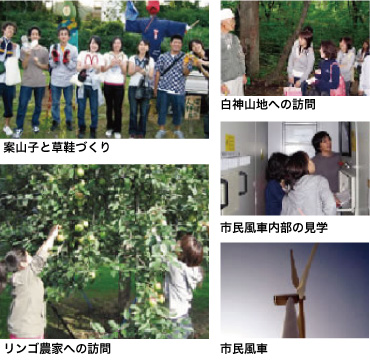
No.5 Fieldwork - Nature, Culture and Tourism in Izu Oshima
In this field study, the students' independence was highly valued from the planning stage. The students themselves decide on the theme and field, go to the field, and develop an awareness of the issues based on specific events they encounter in the field. In 2010, students conducted a survey on the potential for tourism and industry rooted in the nature and culture of the region on Izu Oshima Island. In the course of this research, we decided to pay particular attention to camellia oil. The field study was only the beginning. We will continue to deepen our awareness of the issues in our seminars.
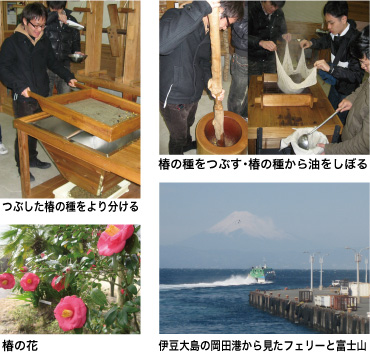
No.6 Global Warming Countermeasures and Science and Technology
In 2010, we visited the Kawasaki Thermal Power Plant to study the mechanism, history, and efficiency improvement of thermal power generation using the combined cycle method. They also visited Doshi Village in Yamanashi Prefecture to observe water source forests, experience tree thinning, and measure the volume of cedar trees in an attempt to calculate carbon absorption. They also interviewed the local people about the CO2 absorption certification system that is currently being promoted there, and discussed its significance and effects. It was a very enjoyable evening spent in a traditional Japanese house, sitting around the hearth. The comparison of "natural power vs. technological power" in global warming countermeasures is developing into a very interesting theme for discussion.
No.7 Learning about global environmental problems through desertification control projects in the Yellow River basin
Currently, desertification is progressing rapidly in many parts of the world. In this course, students will learn about a wide range of global environmental issues, including desertification, water resources, and future food supply issues, while engaging in greening activities in the Ocher Plateau of China's Yellow River Basin, where desertification is progressing. The greening work is carried out while interacting with local people, giving participants a sense of working together for the good of the earth. At the same time, they will receive lectures from local experts on local desertification issues and countermeasures, and visit several sites. In addition, participants learn about the historical heritage and urban environment of Beijing and other cities from a three-dimensional perspective.
